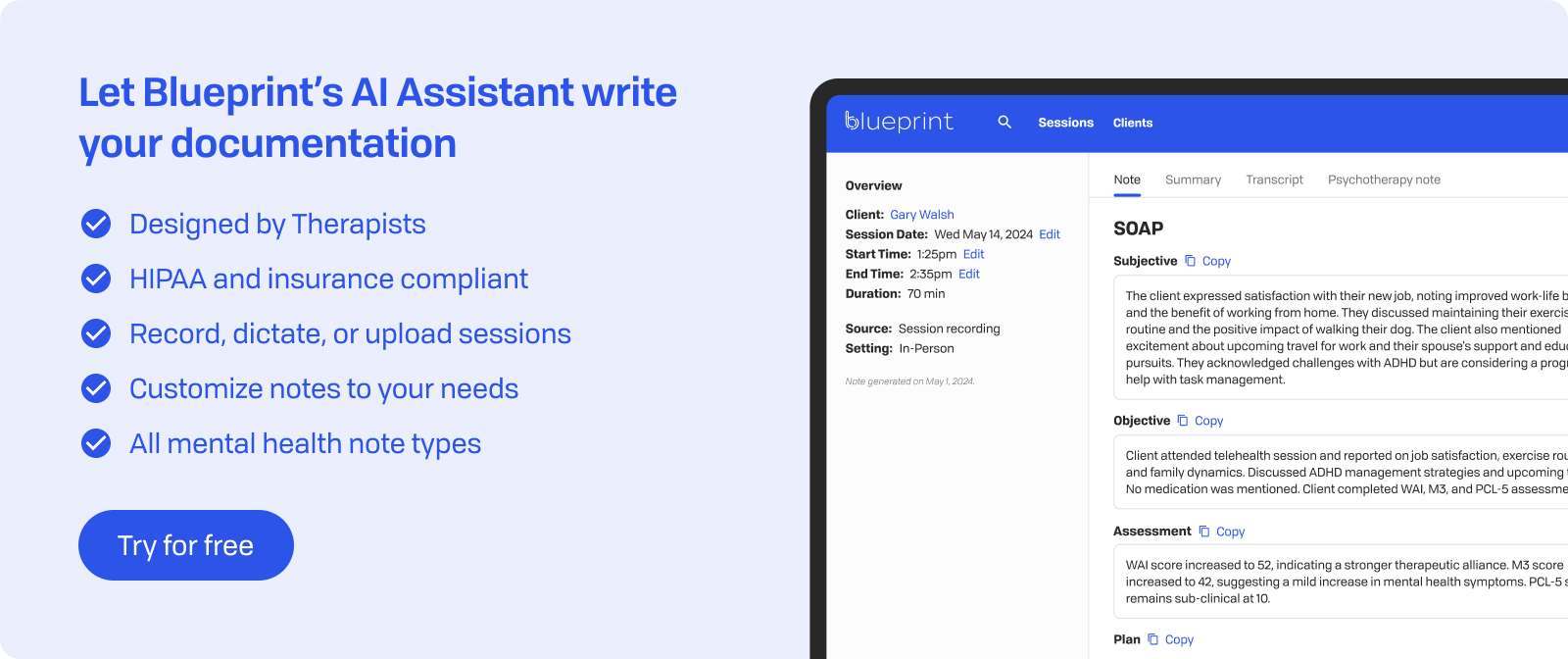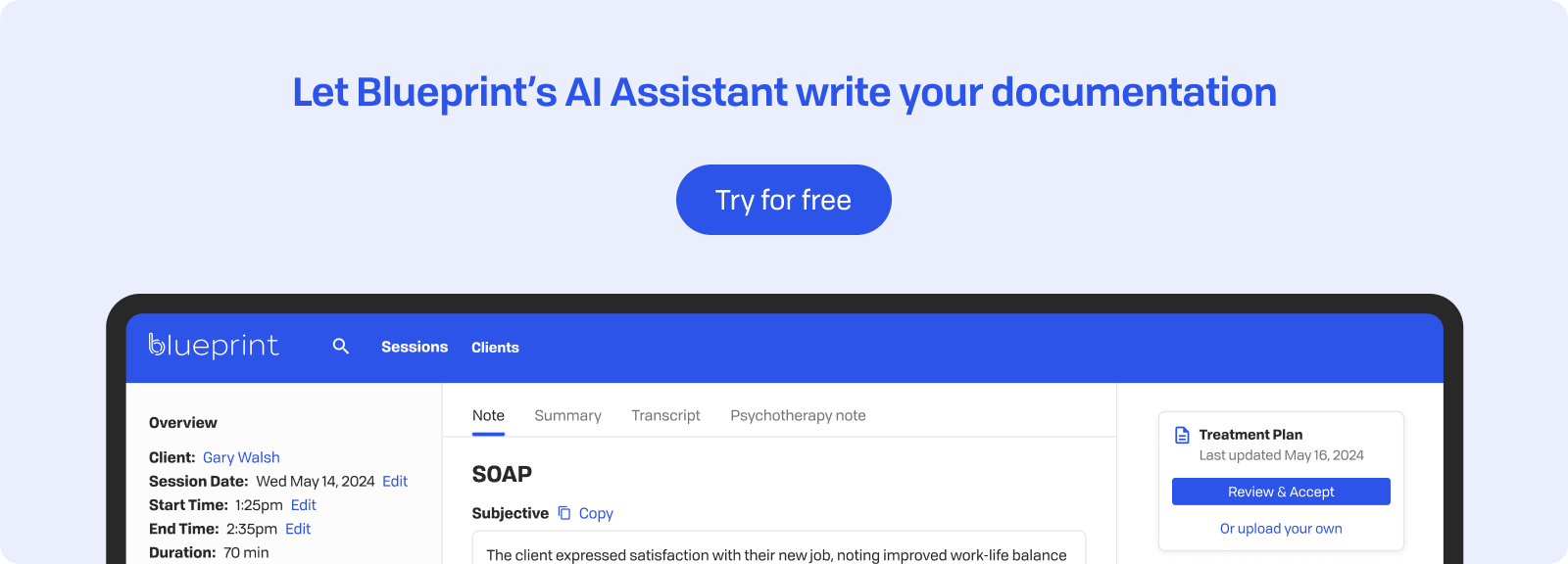In Brief
The journey to becoming a fully licensed counselor rarely follows a straight path. After years in graduate school and countless hours of study, many new counselors find themselves in a transitional phase of their careers.
This stage, where you've earned your degree but haven't yet achieved full licensure, comes with its own title and set of requirements. Knowing this provisional status matters for anyone planning a counseling career or currently navigating the licensure process.
Let's look at what this transitional licensure means, why it exists, and how it fits into your journey toward practicing independently as a counselor.
What Is an Associate Licensed Counselor
An Associate Licensed Counselor holds a provisional license status granted to individuals who have completed their master's or doctoral degree in counseling but still work toward full licensure. This designation allows recent graduates to practice counseling under the supervision of a fully licensed professional while they accumulate the required clinical hours for independent practice.
Different states use various titles for this provisional status, including LPC-Associate (LPCA), Licensed Associate Professional Counselor (LAPC), and Licensed Clinical Mental Health Counselor Associate (LCMHCA). Despite the naming variations, the core purpose remains consistent.
The main function of this licensure tier is to provide a structured pathway for gaining supervised clinical experience. This provisional period acts as a bridge between academic training and independent practice, ensuring new counselors develop their skills under experienced guidance before working on their own with clients.

Educational and Exam Requirements
To qualify for associate licensure, you need a graduate degree in counseling or a related field. Acceptable degrees often include counseling, clinical mental health counseling, psychology, social work, or specialized areas such as art therapy or marriage and family therapy. Your program should meet accreditation standards and prepare you for the specific requirements of your state.
Graduate programs include supervised clinical experience as part of the curriculum:
- Practicum requirements: You need at least 100 clock hours over a full academic term, with at least 40 hours of direct client contact. You'll receive weekly supervision averaging one hour per week, either individually or in small groups, and sometimes both.
- Internship requirements: You must complete at least 600 clock hours in a counseling role, including 240 hours of direct client contact. Weekly supervision includes approximately one hour of individual supervision plus 1.5 hours of group supervision.
Many states require passing a national examination before granting associate licensure. The two most common exams are:
- National Counselor Examination (NCE): Evaluates knowledge across eight content areas, including human growth and development, social and cultural diversity, and counseling theories.
- National Clinical Mental Health Counseling Examination (NCMHCE): Uses clinical simulations to assess diagnostic and treatment planning skills.
Some states allow you to take these exams during your final semester of graduate school, while others require you to complete your degree first. Check your state board's specific requirements, as exam requirements vary significantly across jurisdictions.
Supervision and Scope of Practice
As an associate licensed counselor, you can only work under the guidance of a qualified, board-approved supervisor. This requirement ensures you receive proper support while building your clinical skills and safeguards clients during your transition to independent practice.
Your supervisor must meet specific qualifications set by your state board:
- Active professional license: Your supervisor needs to have a current counseling license in good standing, such as an LPC, LCPC, or an equivalent credential.
- Post-licensure experience: Most states require supervisors to have at least 2 years of clinical practice after obtaining full licensure, though some demand more extensive experience.
- Supervision training: Supervisors must complete specialized training through graduate coursework (typically 3 semester hours), continuing education programs (15-18 hours), or hold credentials like the Approved Clinical Supervisor (ACS) from the National Board for Certified Counselors.
Before starting supervised practice, you must submit a supervision plan to your state board. This plan usually includes:
- Practice locations: Where you'll provide counseling services
- Scope of duties: Types of clients you'll serve and interventions you'll use
- Supervisor credentials: Documentation of your supervisor's qualifications
- Supervision schedule: Frequency and format of supervision sessions
Your scope of practice as an associate remains limited compared to fully licensed counselors. You cannot practice independently, must maintain regular supervision meetings, and need your supervisor's oversight for all clinical decisions. Some states also limit certain activities, such as supervising other clinicians or signing certain documents without your supervisor's co-signature.

Clinical Hour Requirements and Timeline
The journey from associate to full licensure involves gaining a significant amount of supervised clinical experience. Most states require between 2,000 and 3,000 hours of supervised clinical work, but these requirements can vary widely depending on the location.
Here are some state-specific variations:
- Total hour requirements: While many states require 2,000-3,000 hours, some, like Kansas, require up to 4,000 hours of supervised experience.
- Direct client contact: States typically expect 40-50% of your hours to involve face-to-face client interaction.
- Weekly hour limits: Many states limit creditable hours to 40 per week to ensure quality over quantity.
- Supervision ratios: Most require 1 hour of supervision for every 20-40 hours of clinical work.
Completing these requirements usually takes 2-5 years, depending on whether you work full-time or part-time. If you're working full-time (30-40 hours per week), you might finish 2,000 hours in about 18 months. Part-time work naturally lengthens this timeline.
Several states have specific rules about associate licenses:
- Renewal limits: Some states allow associate licenses to be renewed only 2-3 times.
- Maximum timeframes: Certain jurisdictions require completion within 5-6 years.
- Extension policies: States may offer extensions for circumstances like medical leave or military deployment.
Strategically planning your clinical hour accumulation will help you meet your state's requirements on time. Keep detailed records of all clinical and supervision hours from the beginning, as documentation requirements are strict and retroactive credit is rarely granted.

Licensing Progression From Associate to Full LPC
After completing your required clinical hours and supervision, transitioning to full licensure involves several important steps. This process transforms you from a supervised practitioner to an independent professional counselor.
The application process generally includes:
- Clinical hours documentation: Submit detailed logs showing your hours of supervised experience, including dates, types of services provided, and supervisor signatures.
- Supervision verification: Provide attestations from your supervisor(s) confirming completion of required supervision hours and your readiness for independent practice.
- Examination scores: Include passing scores from the NCE or NCMHCE if not previously submitted.
- Application fees: Pay state-specific licensing fees, which typically range from $200-$500.
- Background checks: Complete any required criminal background checks or fingerprinting.
Some states require additional steps such as:
- Jurisprudence exam: Pass a state-specific exam covering local laws and ethical standards.
- Professional references: Submit letters from colleagues or supervisors attesting to your clinical competence.
- Continuing education: Document any required CE hours completed during your associate period.
After approval, your credential changes from "Associate" or "LPC-Associate" to "Licensed Professional Counselor" (LPC). This full licensure grants you several new privileges:
- Independent practice: Open your own practice or work without supervision.
- Insurance paneling: Apply directly to insurance panels as a provider.
- Supervision eligibility: Pursue supervisor training to guide future associates.
- Enhanced credibility: Market yourself as a fully licensed mental health professional.
The entire transition process typically takes 2-4 months after submitting your application, depending on your state board's processing times.
Benefits and Limitations of Being an Associate
Working as an associate licensed counselor offers valuable opportunities along with certain constraints. Knowing both sides helps you get the most from this phase in your career.
Benefits of associate status include:
- Hands-on clinical experience: You'll work directly with diverse client populations while having the safety net of supervision, allowing you to apply classroom knowledge in real-world settings.
- Structured skill development: Regular supervision helps you refine therapeutic techniques, receive immediate feedback on challenging cases, and develop your clinical judgment with expert guidance.
- Building professional confidence: Through validation and constructive feedback from experienced supervisors, you'll develop trust in your clinical decisions and therapeutic approach.
- Ethical guidance and risk management: Your supervisor assists in navigating complex ethical dilemmas and high-risk situations, ensuring client safety while you learn professional standards.
- Preventing burnout: Built-in supervision provides emotional support and encourages self-care practices important for long-term career sustainability.
Limitations to consider:
- Restricted autonomy: You cannot see clients without supervision oversight, make independent clinical decisions, or practice outside your approved supervision agreement.
- Documentation requirements: You must maintain detailed logs of all client hours, supervision sessions, and clinical activities for licensure boards.
- Limited insurance access: Many insurance panels don't credential associates directly, potentially limiting your client base or requiring billing through your supervisor.
- Lower compensation: Associate positions typically offer 20-40% less salary than fully licensed counselors, reflecting the training nature of the role and supervision costs.
- Geographic restrictions: Your practice is limited to locations approved in your supervision plan, reducing flexibility in where you can work.

State-Specific Example (Pennsylvania Snapshot)
Pennsylvania provides a straightforward route to associate licensure, showing how state requirements can differ. The state uses the title "Licensed Associate Professional Counselor" (LAPC) for its provisional licensure level.
Educational requirements in Pennsylvania are similar to most states—you need a master's or doctoral degree in counseling or a related field from an accredited institution. The program must include at least 60 credit hours of graduate coursework. Unlike many states, Pennsylvania doesn't require passing the NCE or NCMHCE at this stage, making initial licensure easier to obtain.
Supervision requirements involve submitting a detailed plan that includes:
- Practice locations: Names and addresses of all employers where you'll provide client services
- Job descriptions: Specific duties you'll perform at each location
- Supervisor qualifications: Documentation showing your supervisor meets state standards
Pennsylvania requires that at least half of your supervision hours come from a licensed professional counselor with 5 years of experience within the last decade. The remaining supervision can come from similarly qualified counselors or experts in related fields with comparable experience.
Financial considerations are relatively modest compared to other states:
- Application fee: $75 for LAPC licensure
- Continuing education: Minimal requirements during the associate period
- Renewal fees: Reasonable annual costs to maintain your license
The LAPC license allows you to practice under supervision while accumulating the 3,000 hours required for full licensure. This enables insurance billing through your supervisor and provides professional recognition during your training period.
Key Takeaways
Associate Licensed Counselor status acts as the important link between completing your graduate education and achieving full licensure as an independent practitioner. This provisional credential allows you to start your clinical career while you meet strict state requirements for supervised experience.
The path requires several important components:
- Advanced education: A master's or doctoral degree in counseling or a related field from an accredited institution
- Supervised clinical hours: 2,000-3,000 hours of direct client work under qualified supervision
- State compliance: Meeting jurisdiction-specific requirements for exams, documentation, and renewal timelines
Supervision during this period provides more than just oversight—it ensures ethical client care while supporting your professional development. Your supervisor guides you through complex cases, helps navigate ethical dilemmas, and aids your growth from student to competent clinician.
Successfully transitioning to full licensure opens many professional opportunities. You'll gain the ability to practice independently, establish your own practice, join insurance panels directly, and potentially supervise future associates. These privileges come with increased earning potential and professional autonomy.
State requirements vary dramatically across jurisdictions. Some states require the NCE exam immediately, while others defer testing until later. Supervision ratios, hour requirements, and renewal limits all differ based on location. Telehealth regulations add another layer of complexity, as you must comply with licensure laws where your client is physically located, not just where you practice.
Keeping up with your state's specific regulations remains important throughout your associate period. Regular consultation with your state licensing board ensures you maintain compliance and progress efficiently toward independent practice.











